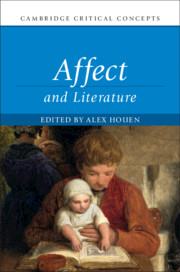Book contents
- Affect and Literature
- Cambridge Critical Concepts
- Affect and Literature
- Copyright page
- Contents
- Notes on Contributors
- Introduction
- I Origins
- II Developments
- III Applications
- Chapter 18 Affect and Environment in Contemporary Ecopoetics
- Chapter 19 Contemporary Crisis Fictions: Twenty-First Century Disaffection
- Chapter 20 Shiny Happy Imperialism
- Chapter 21 The Digital’s Amodal Affect
- Chapter 22 Digital Special Affects: On Exhilaration and the Stun in CGI Blockbuster Films
- Chapter 23 Cartesian Affect
- Index
Chapter 23 - Cartesian Affect
from III - Applications
Published online by Cambridge University Press: 16 January 2020
- Affect and Literature
- Cambridge Critical Concepts
- Affect and Literature
- Copyright page
- Contents
- Notes on Contributors
- Introduction
- I Origins
- II Developments
- III Applications
- Chapter 18 Affect and Environment in Contemporary Ecopoetics
- Chapter 19 Contemporary Crisis Fictions: Twenty-First Century Disaffection
- Chapter 20 Shiny Happy Imperialism
- Chapter 21 The Digital’s Amodal Affect
- Chapter 22 Digital Special Affects: On Exhilaration and the Stun in CGI Blockbuster Films
- Chapter 23 Cartesian Affect
- Index
Summary
In the widespread affective turn, with all its diverse claims for distributed cognition, embodiment, emergence, emotion, feeling, connectedness and shared animality or companionship with non-humans, there would seem to be one point of consensus: we are not Cartesian. We are not minds contingently or unfortunately housed in bodies; we are not brains in a vat, or ghosts in a body that is nothing more than a machine. If there is any ‘we’ or unity today it is perhaps defined by one point of consensus; there is no such thing as mind that is not an emergent property of a broader milieu of affect. In this chapter I want to make three claims. This broad consensus derives from Heidegger’s criticism of Descartes, and his argument that logic and subjectivity are effects of a comportment to the world. Second, what has not been so well discussed is that Heidegger’s criticism of Descartes nevertheless argues that there is a certain Cartesian comportment, or mood. Finally, it is the sense of loss of this Cartesian comportment – the fragility of Cartesian feeling – that typifies many twenty-first-century expressions of preliminary post-human mourning.
Information
- Type
- Chapter
- Information
- Affect and Literature , pp. 425 - 443Publisher: Cambridge University PressPrint publication year: 2020
Accessibility standard: Unknown
Why this information is here
This section outlines the accessibility features of this content - including support for screen readers, full keyboard navigation and high-contrast display options. This may not be relevant for you.Accessibility Information
- 2
- Cited by
